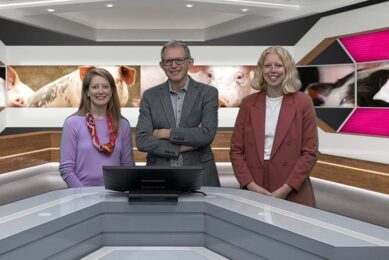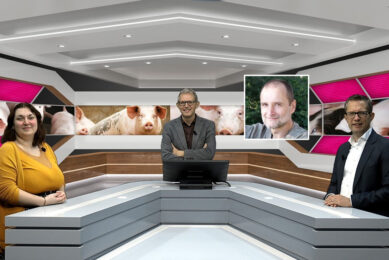On-demand: Webinar on antibiotic reduction

Pig producers are striving to curb antibiotic use as much as possible, but how do they manage gut health issues without the use of antibiotics? Experts at Pig Progress’ latest antibiotic reduction webinar discussed this pertinent topic and offered interesting insights. The webinar is now available for viewing on-demand.
In cooperation with Ceva Animal Health and Perstorp, Pig Progress editor, Vincent ter Beek, hosted this informative webinar where he speaks to experts who share their insights and expertise. Together they each emphasised that antibiotics are problem-solvers and not solutions, focusing on various factors to reduce the use of antibiotics.
Click here to view the webinar on-demand
Management strategies to mitigate the heat stress effects
‘Antibiotic reduction in pigs’
Dr Albert van Dijk, senior consultant swine nutrition at Schothorst Feed Research in the Netherlands
Dr van Dijk looked at the development of antibiotic use in pigs before and after 2006 when a ban of antimicrobial growth promoters in the EU was enforced. He highlighted nutrition solutions as an alternative to antibiotics and considered the role of functional fibres and crude protein in feed, and the significance of lower buffering capacity. Van Dijk also shared in his presentation the interesting results of his own PhD research on plasma in pig feed.
“Biosecurity and hygiene will solve 50-60% of the problem, and nutrition another 30%.”
‘Why a healthy gut is the preferred way to performance’
José Maria Ros Felip, global technical manager at Perstorp Animal Nutrition
Post-weaning is a big challenge in pig production and numerous stressors are introduced to the pigs which can result in the threat of pathogens, said Ros Felip who joined virtually from Spain. He noted that in Denmark, a significant pig producer, the average consumption of antibiotics is 2 or 3 times lower than in the EU, so there is room for improvement, he says. This, however, cannot happen overnight; gut health is a long-term solution. He emphasised a holistic approach to gut health and highlighted butyric acids (specifically tributyrin) which, he said, hold a special position among short-chain fatty acids.
“…if biosecurity and nutrition are key, and if these are not prioritised, feed additives can add little value.”
‘Vaccination against edema disease: an effective strategy for the reduction of antibiotics and zinc oxide use’
Daniel Šperling, swine corporate technical manager at Ceva Santé Animale
Šperling discussed the effect of vaccination on the reduction of antibiotics and zinc oxide as well as its effect on feed conversion rate and feed efficiency.
“Vaccination of piglets is the most effective tool for the control of oedema disease to reduce/eliminate the need for zinc oxide and antibiotics.”
In closing, one viewer asked how much extra it would cost per kg of pork to introduce measures to keep antibiotics out. Dr van Dijk shares his answer.
 Beheer
Beheer








 WP Admin
WP Admin  Bewerk bericht
Bewerk bericht